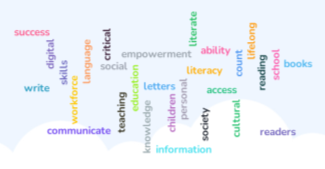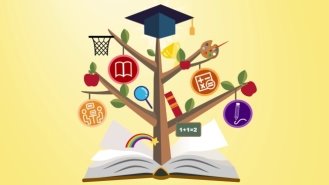This article revises existing definitions of the term ‘literacy’ and considers its transformation in the time of advanced technologies. It also addresses the challenges educators face due to changes in people’s lifestyle and behavior patterns. Some practical suggestions for bringing literacy into the classroom are provided at the end.
The term literacy can be interpreted differently depending on who is defining it and the perspectives that people have. It has evolved since 1958 when the United Nations Educational, Scientific and Cultural Organization (UNESCO) gave to the world its first definition. Since then the understanding of what it means to be literate changed constantly. Ahmed (2011) studied through all the definitions provided by the UNESCO and points out the main three.
Table 1
UNESCO definitions of literacy
|
A person is literate who can, with understanding, both read and write a short simple statement on his or her everyday life (UNESCO, 1958). |
|
A person is functionally literate who can engage in all those activities in which literacy is required for effective functioning of his or her group and community and also for enabling him or her to continue to use reading, writing and calculation for his or her own and the community’s development (UNESCO, 1978). |
|
Literacy is the ability to identify, understand, interpret, create, communicate and compute using printed and written materials associated with varying contexts (UNESCO, 2004). |
|
Literacy involves a continuum of learning in enabling individuals to achieve his or her goals, develop his or her knowledge and potential, and participate fully in community and wider society (UNESCO, 2017). |
This illustrates what transformations the term has gone and the range of capacities the humanity needed to have in different time periods. It is no longer enough to be able to read and write in order to be considered as literate.
In Kazakhstan functional literacy has gained significance recently amid the PISA test results and ranking. Generally, by literacy we mean basic skills as to read, write and calculate. However, it is more complex than that. Being able to read is not enough; one needs to have an ability to comprehend the gist, deduce meaning of certain details and be able to respond in case it is an email or fulfill any other official document. According to the recent definition by UNESCO, the term literacy describes a person’s abilities to read, write and do calculations to meet daily life demands’, function as a member of a community and contribute to its development. When it comes to the question how one is supposed to acquire these skills, the society will turn to schools.
Being a basic institution, schools are in charge of forming life-important competencies and knowledge. At school one learns how to add numbers, fulfill equations, form words from letters, express one’s thoughts in written form, send and respond to letters. Recent literacy rate in the world and in Kazakhstan particularly, 85 % and 99.8 % respectively, show that schools are succeeding in preparing individuals to be competent members of their communities (UNESCO 2015; World Bank Data 2015). However, the recent transformations taking place in society have made their impact on the way people receive and conceive information.

The latest advances in technology have made people’s lives much easier in many ways. Plenty of industrial processes, human-operated functions have been automatized. Even in daily life gadgets and mobile applications fulfill many services which could have taken great amount of time a few decades ago. There is a great deal of online applications that can do calculations, generate sentences for using in official documents, and perform some other basic tasks. It comes no surprise that younger generation tends to rely on technology a lot and they wonder why one should work hard to acquire skills if they can have their demands completed by gadgets.
The era of new technologies has definitely influenced the significance of being functionally literate. No has human ever been buried in such amount of data flooding from everywhere. Beginning with TV, radio, the Internet ending with social media and messengers. Moreover, even the term ‘literacy’ has gained a new interpretation in order to meet the demands of new age. Being able to read, write and do sums is just one side of the issue. In this era of advanced technologies one needs to be able to use these concepts sensitively and accurately.
What does being literate in the new age mean? In order navigate in the information spread in social media or on different Internet platforms one needs to be able to interpret and evaluate it. Being confronted with huge amount of data represented in different formats it is important not to trust everything what you read, but critically analyse the source and the data itself.
Being competent in spoken and written speech does not guarantee that one can efficiently convey his thoughts in a virtual environment. For this a person needs to be functionally proficient to clearly express ideas, ask and respond to questions appropriately, maintain trust and respect while communicating through messengers or other virtual platforms.
What the most significant among all these is an ability to acquire new skills, discover new innovations in order not to be left behind. Only learning throughout one’s entire life may allow keeping oneself up to date.
All these capacities are essential to live a full life and be a professional in workplace. As schools are in charge of preparing the younger generation to life, they are supposed to be taught all important skills and knowledge inside the educational institution and graduate being literate and competitive. In order to meet the new demands, educationalists need to accept the challenge and adapt their classrooms.
Hervey (2013) states how complex the system of learning and teaching has become, and that there are many challenges for teachers to face teaching children literacy in the classroom. She suggests these steps be profound for any teacher:
— routinely and explicitly demonstrate how proficient readers and writers make meaning of, and construct, texts;
— demonstrate skills and strategies in a variety of ways to cater for different learning styles;
— demonstrate the use of reading skills and strategies across all learning and expect students to use them in all content areas;
— provide opportunities for students to discuss texts, developing appropriate language for meaningful talk;
— support or guide students as they practice the skills and strategies demonstrated;
— provide daily opportunities for students to independently practice skills and strategies in authentic contexts;
— encourage students to self-reflect and goal set (Hervey, 2013).

One more challenge for educators these days is including literacy skills into any activity on any subject. On Math classes teachers could encourage their learners to give full answers instead of just writing just a number, especially in word problems. Tasks requiring math application could be used for developing problem-solving skills. On art classes learners might be asked to express their feelings and attitudes to different art pieces in written form. Literature lessons are perfect for instilling love of reading. Teachers might feel restricted in choosing fiction, poetry by the curriculum; however, not limiting children in their choice of what to read could be motivating.
Teaching writing it is important to involve learners into completing not only long-text essays but practice producing short texts as well. In future they will mostly write brief notes or replies to emails. Giving them both types of tasks will enable students to develop life important competencies. Including an element of literacy into the learning process teachers create an environment in which students receive added exposure and they see that reading and writing are essential skills for life.
Despite the changing times and evolution of technologies, there is still a demand to be literate. Every decade has its own requirements for humans, therefore, it is essential to be up to date with the recent demands. For enabling learners be on track, teachers need to be aware of the latest changes.
References:
- Ahmed, M. (2011). Defining and measuring literacy: Facing the reality. International Review of Education. https://www.researchgate.net/publication/251340576_Erratum_to_Defining_and_measuring_literacy_Facing_the_reality
- Hervey Sh. What is effective teaching of literacy? (2013). https://www.generationready.com/wp-content/uploads/2021/04/Effective-Teaching-of-Literacy.pdf
- Literacy in the Information Age. OECD report. (2000). https://www.oecd.org/education/skills-beyond-school/41529765.pdf
- Montoya S. (2018) Defining Literacy. https://gaml.uis.unesco.org/wp-content/uploads/sites/2/2018/12/4.6.1_07_4.6-defining-literacy.pdf
- Oxford, B. (2018). Redefining literacy in the 21 st century. https://medium.com/literate-schools/redefining-literacy-in-the-21st-century-139894b14fd4
- Rafferty, C. (1999). Literacy in the Information Age. https://www.ascd.org/el/articles/literacy-in-the-information-age
- The World Bank Data (2015). Literacy rate in Kazakhstan. https://data.worldbank.org/indicator/SE.ADT.LITR.ZS?locations=KZ
- UNESCO (2015). Adult and Youth Literacy.
- UNESCO Glossary. Term ‘functional literacy’. http://uis.unesco.org/en/glossary-term/functional-literacy







